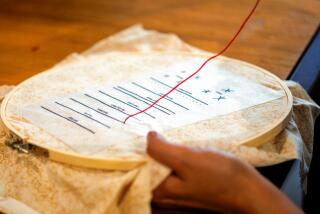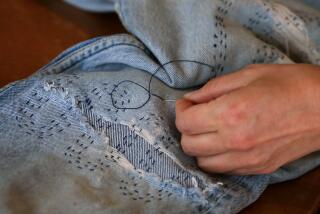A Different Kind of Peace-Work : A Camarillo woman shares her skills and helps impoverished Nicaraguans learn the sewing trade.
- Share via
Fifty years ago, Ruth Smith earned a degree in home economics. But since her retirement in 1983, the modern-day Mrs. Jellaby has devoted her sewing skills to a special kind of peace-work.
The 71-year-old former Marine Corps sergeant, mother of three and grandmother of four is the powerhouse volunteer behind a project to teach women in Nicaragua sewing skills that can earn them a livelihood.
Smith’s latest request for sewing machines and supplies began after she returned in April from a three-week visit to Nicaragua, where she and friend Patricia McCully have established a sewing school called Circulo de Amigos.
Smith’s slide presentation in her Spanish IV class at Ventura College inspired fellow students and instructor Patricia Rush to help collect the needed items. The college’s Language Laboratory served as a collection point until Tuesday. That morning, Rush’s husband, Bud, drove a moving van containing toys, children’s clothes, six sewing machines and 30 boxes of sewing and school supplies to Huntington Beach, where the shipment was loaded onto a convoy of trucks from the Pastors of Peace project. The six trucks were headed for Nicaragua.
Smith was overwhelmed with the community’s response. Especially touching was 83-year-old Mary Farrall’s donation. The Camarillo resident and retired seamstress donated her console sewing machine.
“I learned to sew at the age of 5 on a peddle machine,” Farrall said. “But I’ve had two heart surgeries and have to take it easy. It’s nice to know some people will make a living with their sewing.”
McCully purchased a house for $7,000 in Jimotego, a small city near a mountain range in the northwest region of Nicaragua. Smith said they chose this remote town because a large portion of the inhabitants are refugees from the civil war and have nothing.
Slides she showed me revealed dirt floor huts usually without indoor plumbing or electricity. “Water is only available for 30 minutes a day, so families line up at the outdoor spigot with buckets to collect enough water for all their uses for the entire day,” Smith said.
Smith and McCully poured a concrete floor and equipped the house with sewing machines, cutting tables and materials that local women could never afford. The teaching program is supported primarily by donations from Smith’s and McCully’s friends, communities and church.
Enough supplies have been collected, Smith said, to begin a second sewing school in another village, Mulukuku. Meanwhile, the Jimotego project, she said, is being run by HayDee Gonzalez, a 50-year-old mother of 11 children, who was widowed 10 years ago in the civil war. With the help of her son Jared, 16, Gonzalez has been just getting by by selling bread she bakes in a makeshift outdoor mud oven. Now she sews and keeps the house going.
And Jared, she proudly explained, is also learning to sew during the day, and he has resumed his education at night. “He stopped his education in the second grade to help his mother make a living,” Smith said. “But I got him back in school.”
A longtime member of the peace movement and a local coordinator for a national organization called Educators for Social Responsibility (ESR), Smith said her interest in helping the people of Nicaragua began during a visit to neighboring Costa Rica in 1982. After returning to Camarillo, she met activist Alice McGrath of Ventura and joined her delegation to visit Nicaragua’s refugee camps. After that trip, Smith met McCully at a Unitarian church function and was recruited for the sewing program. “I’d taught adult sewing classes in Camarillo during the evening for 12 years--mostly to Hispanic women,” Smith said.
Smith, who was a reading specialist for 27 years in the El Rio and Camarillo school districts, is delighted that Nicaragua is making education and literacy a national priority.
“But by teaching the women to sew,” she said, “we’re giving them a skill and some hope.”
* FYI
For information about the Circulo de Amigos sewing program, call 482-2404.
More to Read
Sign up for Essential California
The most important California stories and recommendations in your inbox every morning.
You may occasionally receive promotional content from the Los Angeles Times.













